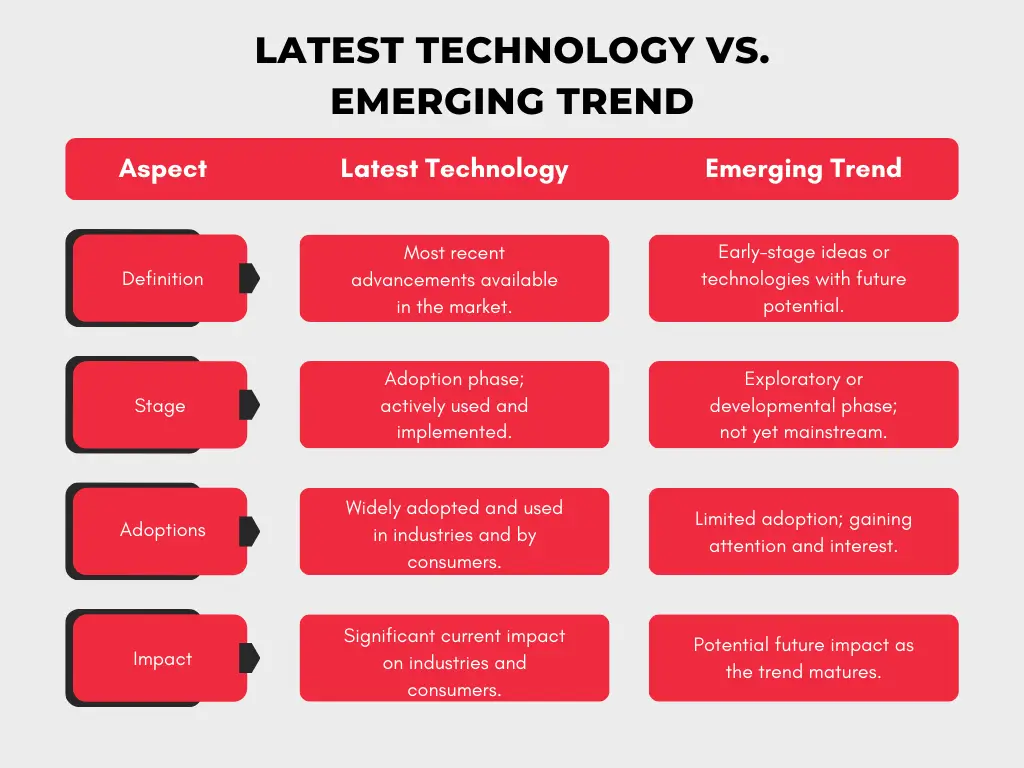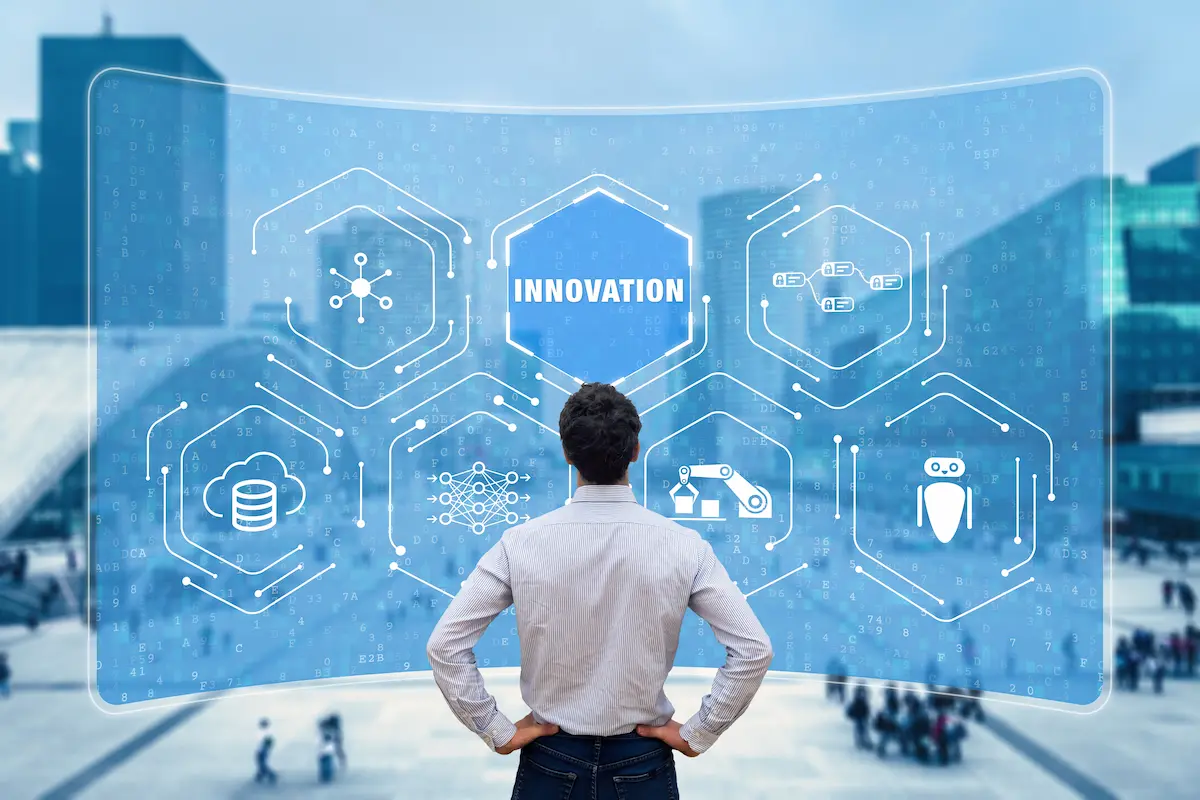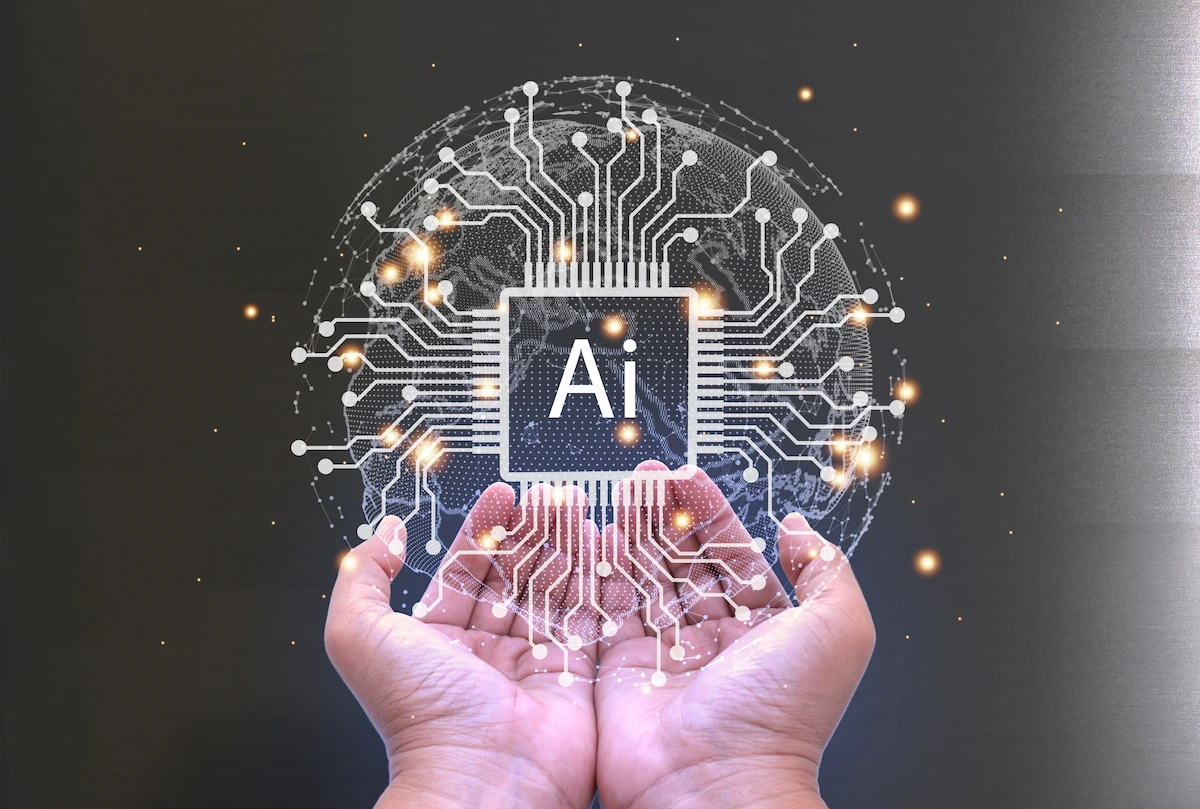The latest technologies in the software industry are setting the stage for revolutionary changes in how businesses innovate and compete. If your business thrives on staying ahead with cutting-edge solutions, you've come to the right place. Here, you will explore the latest software and technology trends that will dominate in 2025. Among them, you will learn about advances in machine learning, artificial intelligence, virtual and augmented reality, blockchain, cloud services, among others.
Are you ready to dive into the future of software trends? Let's uncover all these new technologies and software solutions that will make your business shine!
But first, let's clarify the terminology, so we are all speaking the same language. Ready?
What is an Emerging Software?
When we refer to an emerging software, we're talking about the latest trends in software development that create cutting-edge solutions. This term describes software that is still in its early stages of development but shows excellent potential for the future.
Emerging technology is reshaping the software development landscape through innovative tools or revolutionary techniques, making it easier to create increasingly powerful solutions tailored to user needs. Here, the developers leverage their creativity to craft innovative solutions by developing state-of-the-art software applications that meet the demands of our rapidly changing world.
Examples of Emerging Technology in Software Development
As the software industry continues expanding, a constant stream of emerging technologies transforms software development across various industries. The future of development is looking bright, with exciting possibilities within Artificial Intelligence (AI), Machine Learning (ML), the Metaverse, Blockchain technology, the Internet of Things (IoT), Quantum Computing, 5G Technology, Augmented Reality (AR), and Virtual Reality (VR), among others.
As the software industry continues expanding, a constant stream of emerging technologies transforms software development across various industries. Among them, the Internet of Things (IoT) stands out for its connectivity potential and impact on data-driven decision-making. IDC forecasts that worldwide spending on IoT will reach $1.1 trillion in 2025, reflecting a rapid adoption that spans manufacturing, supply chains, and smart-home initiatives. This growth signals the IoT’s vital role in reshaping how businesses operate and deliver user-centric solutions.
The future of development is looking bright, with exciting possibilities within Artificial Intelligence (AI), Machine Learning (ML), the Metaverse, Blockchain technology, the Internet of Things (IoT), Quantum Computing, 5G Technology, Augmented Reality (AR), and Virtual Reality (VR), among others.
Let's differentiate between emerging trends and the most recent technologies.

But what are the latest technologies every business should be aware of? And how can you use them to improve efficiency and productivity within your organization? Let's find out.
What are the Emerging Trends in the Software Industry?
So far, we've talked about emerging technologies, but what are the key emerging trends? Let's review some key innovations that are driving the industry forward.
Low-Code and No-Code:
You no longer need to be a seasoned developer to create an app. The rise of low-code and no-code platforms empowers business users to build applications and automate processes without deep technical knowledge. In fact, Forrester predicts the low-code development platform market will grow to $21.2 billion by 2027, underscoring how organizations are embracing rapid app delivery solutions to fill developer skill gaps and accelerate digital transformation.
Generative AI Coding Assistance:
Generative AIhas taken the spotlight — and for good reason. Tools like GitHub Copilot and ChatGPT are helping developers write code faster, automate repetitive tasks, and streamline debugging. It's not just hype — it's a real productivity boost.
Cloud-native Application Development:
Instead of simply hosting apps in the cloud, teams are now building for the cloud from day one. This means greater scalability, flexibility, and performance — all critical as businesses demand more from their digital solutions.
Blockchain Technology:
Most people associate Blockchain exclusively to Bitcoin, but Blockchain's use goes beyond cryptocurrency applications. It’s being used to secure data, automate transactions, and support cybersecurity strategies — especially inmulti-cloud environments. It’s a powerful tool in the right hands.
DevOps Practices:
If you’ve ever wondered what DevOps isall about, think of it as the secret sauce behind faster, more reliable software releases. It bridges the gap between development and operations teams — improving collaboration, reducing errors, and speeding up delivery cycles.
Integration of IoT and User Experience (UX) Priority:
As more devices get connected, software must evolve to create seamless, user-friendly experiences. Take Rolls-Royce, for example: they’ve embedded IoT sensors into aircraft engines to monitor performance in real-time. This allows them to predict and fix issues before they happen — saving money and improving safety. It’s a perfect example of how IoT, when paired with smart UX, can make a real impact.
So, What’s Next for Your Business?
All these trends point in the same direction: faster, smarter, and more human-centered development. But what does that look like for your organization? And how can you take advantage of these technologies to boost productivity and efficiency?
Keep reading — we’ll walk you through what’s next, and how to make it work for you.
Read this to discover IT staff augmentation trends shaping the business future and industry.
12 Latest Technologies in the Software Development Industry

The world is constantly advancing and innovating in the software industry, and companies like yours are looking for new technologies to stay competitive. Below are the latest software technologies and trends you should know to up your game.
1. The Cloud Computing Emergence
Cloud computing has skyrocketed as a software development technology, granting businesses unmatched flexibility and scalability. According to Flexera’s 2023 State of the Cloud Report, 93% of enterprises now have a multi-cloud strategy, reflecting how mainstream cloud-native development has become. As we see, by enabling organizations to store and access data online securely, cloud computing boosts efficiency, cuts costs, and fuels global digital transformation.
Case in Point of Cloud Computing
A successful case study is Netflix, which migrated its entire streaming serviceto the cloud, allowing it to handle massive spikes in viewer traffic without overinvesting in physical infrastructure. This scalable approach enables Netflix to deliver a smooth user experience worldwide, reinforcing why cloud solutions are pivotal in modern software development.
2. Popular Programming Languages
Programming languages are vital to new software development technologies. However, established languages like Java, Python, and Kotlin are still favored for business apps. While Node.js and React Native excel at crafting dynamic and adaptable websites and apps.
Furthermore, C# offers superior performance and ease of use. Not to mention, .Net provides a robust framework that makes it the ideal choice for developing enterprise-level applications. And remember that C#, with its robust typing system, offers increased security and protection against bugs.
According to the TIOBE index, Python is still undefeated in popularity. However, Java and C+ are hot on their heels as the top-rated programming languages.
Interesting, right? Now it's time to read why Python is the go-to programming language. If you need to learn more about Java development, read here to discover what Java is used for, alongside all these amazing programming languages.

3. Hybrid App Development
Hybrid App development is one of the most exciting latest software development technologies. It combines the advantages of web and native apps to offer the best of both worlds. As a result, the latest software development technologies, like React Native and Xamarin, have become powerful allies for developers.
4. Progressive Web Applications (PWA)
Progressive Web Apps are one of the latest emerging software development technologies, transforming how businesses approach mobile app development. PWAs offer the benefits of native apps, such as offline capabilities and push notifications, providing the convenience of web-based apps.
5. Low Code Deployment
A rapidly emerging software development technology offering a more intuitive approach to programming. Using low code deployment, developers can focus on the strategic aspects of development.
6. Augmented Reality and Virtual Reality (AR/VR)

From mind-blowing gaming experiences to cutting-edge healthcare applications and beyond, Virtual Reality (VR) and Augmented Reality (AR) have genuinely remarkable immersive potential.
7. DevOps Adoptions in Software Development
DevOps is a collaboration between development and operations, and it's essential for the future of software development. Our DevOps approach helps businesses manage the pace of change, ensuring reliable software delivery. We meet the needs of our clients through effective communication and collaboration.
8. Blockchain Technology in Software Development
Blockchain technology has the potential to revolutionize software development by enhancing security, transparency, and decentralization. According to a 2023 report by MarketsandMarkets, the global blockchain market is projected to grow from $7.4 billion in 2022 to $94.0 billion by 2027, at a CAGR of 66.2%. This rapid expansion underscores blockchain’s increasing relevance across industries, inspiring organizations to innovate and build more secure, reliable solutions rooted in distributed ledger technology.
Blockchain in action:
A great example is Walmart, which employs blockchain to trace leafy greens from farm to store shelf. By recording each supply chain step on an immutable ledger, they’ve reduced produce traceability time from days to seconds. This not only improves consumer safety but also streamlines recalls and minimizes waste—showcasing how blockchain can revolutionize traditional processes. Amazing, right?
Furthermore, other industries are witnessing transformative change, such as blockchain development in the insurance industry, which is emerging as a powerful solution to reshape traditional processes and improve efficiency, transparency, data Protection, and risk mitigation. It is also important to mention the impact of blockchain on education to protect academic records, simplify identity verification, and mitigate fraud.
Read this article about why Blockchain is the new favorite of the software development industry here.
9. Evolution of Artificial Intelligence (AI) in the Software Industry
Artificial Intelligence (AI) and Machine Learning (ML) significantly impact software development, bringing automation and intelligence. In fact, according to Gartner, global enterprise spending on AI software is forecast to reach $134.8 billion by 2025, reflecting a compound annual growth rate (CAGR) of over 21%. This immense growth highlights AI’s capacity to deliver data-driven services, with personalization emerging as a key differentiator—especially in e-commerce.
How AI and ML Are Being Used in Technology:
A great example is Amazon. This company leverages machine learning algorithms to analyze customer behavior, browsing history, and purchase patterns. Amazon personalizes its product recommendations, boosting user engagement and significantly increasing sales conversions. As you see, this real-world example underscores AI’s ability to deliver tangible ROI through data-driven insights.
These technologies offer new opportunities to improve development efficiency and quality, and will continue to transform the industry profoundly. They’ve already changed how we develop, test, deploy, and maintain software, and their influence only grows stronger with time.

Here are the most common and relevant Artificial Intelligence (AI) development trends in the software development industry, enabling improved efficiency in various applications and processes:
AI for Cybersecurity
AI-Driven Automation
Natural Language Processing (NLP) and Conversational AI
Generative AI
Developers use Artificial Intelligence AI models to generate programming code, content, and design elements, accelerating the development process and increasing speed.
AI for Agile Project Management
AI for Predictive Analytics
AI-Enhanced Data Analytics
AI for Personalization
AI in Edge Computing
AI in DevOps (AIOps)
Ethical AI and Explainable AI (XAI)
AI in Software Testing
AI for Edge AI (Edge Intelligence)
AI-Driven Continuous Integration and Continuous Deployment (CI/CD)
AI for Code Review and Optimization
AI-Powered Analytics in Software Development
AI for Enhanced User Interface (UI) and User Experience (UX) Design
AI in Continuous Monitoring and Maintenance
You might consider a few additional Artificial Intelligence trends that are increasingly relevant in the software industry, such as AI-Driven Security Vulnerability Detection, AI for Resource Allocation and Optimization, AI for Model-Driven Development (MDD), AI for Intelligent Code Refactoring, AI in Software Architecture Design.
10. The Impact of Machine Learning on Software Development
Machine Learning (ML) has revolutionized the field of software development. It has impacted this industry, influenced how applications are conceived and developed, and improved development processes, among other virtues. Moreover, Machine Learning continues to evolve, focusing on creating and implementing algorithms that allow software applications to predict outcomes without explicit programming.
11. Robotics and Automation in Software Development
Robotics and automation are disruptive, and the latest software development technologies are already transforming the landscape. Automating repetitive and labor-intensive tasks helps developers work more efficiently and reduce errors.
Test automation is becoming an indispensable tool in the software development process. With the rise of robotics and automation, it is evident that developers need to work smarter, not harder, to keep up with the pace of change. Test automation lets pro Engineers streamline their workflow by automating repetitive and laborious tasks, freeing up time to focus on higher-level, complex issues.
Emerging software technologies are constantly reshaping the software development landscape. By embracing the latest advancements, businesses can stay ahead of the curve and deliver innovative solutions that meet their customers' evolving needs.
12. Microservices Architecture
These great technologies drive innovation in the software industry and provide modern solutions for new and evolving business challenges. In the software development industry, you should also be aware of other emerging technologies and trends, such as Edge Computing, Quantum Computing, Serverless Architecture, Containerization and Kubernetes, 5G Technology, Cybersecurity Enhancements, Extended Reality (XR), and API-first development.
Emerging software technologies are constantly reshaping the software development landscape. By embracing the latest advancements, businesses can stay ahead of the curve and deliver innovative solutions that meet their customers' needs. Below, we will examine some risks behind software development trends and some aspects you should consider regarding security and privacy.
Potential Risks Behind Emerging Technologies

While emerging technologies offer many benefits, companies must be aware of potential risks, including security vulnerabilities and rapid obsolescence.A 2023 Ponemon Institute study found that 52% of organizations reported data breaches linked to newly implemented technology lacking mature security controls. By recognizing these dangers and proactively addressing them, businesses can embrace innovation while safeguarding their systems and data.
Read this if you want to learn how using Machine Learning (ML) algorithms in cybersecurity reduces workload, efficiently processes data, and identifies threat profiles.
Key Security and Privacy Considerations in the Software Development Industry
In the software industry, security and privacy are two fundamental aspects we must not ignore if we want to succeed at all application development life cycle stages. And there is a fundamental reason for this: the constant evolution of threats and data breaches, which are becoming increasingly costly. This leads organizations like yours to prioritize the protection of confidential information, as well as comply with increasingly strict regulations. Here are some security and privacy considerations in software development:
Secure Code Development Practices
Data Encryption and Data Protection
Authentication and Authorization
Privacy by Design
Regular Security Audits and Penetration Testing
Software Security Updates
Compliance with Legal Requirements
Incident Response and Disaster Recovery
To effectively integrate security and privacy protection into your software development, your development and operations teams can adopt emerging trends—such as DevSecOps, Artificial Intelligence/Machine Learning, blockchain, and privacy-enhancing technologies (PETs)—to ensure best practices are in place from the ground up.
Why are Technology Trends Important for Business?

In today's challenging business landscape, keeping a vigilant eye on technological trends, especially trends in software engineering, is key for businesses to achieve sustained success. Here are some advantages of staying up to date with the latest technologies and software trends:
The Role of Talent and Skill Software Developers in the Software Industry

Developers technical expertise, creativity, and problem-solving skills are essential in shaping the future of technology, making them indispensable in pursuing groundbreaking software solutions.
Talented and adequately trained software developers are fundamental in creating and developing new technologies that are transforming the software landscape. They also contribute their creativity to the advancement and evolution of software development trends.
The software developers' contributions span the following areas:
Innovation and Ideation
Development and Implementation
Integration of Emerging Technologies
Optimization of Systems
Collaboration Across Disciplines
Training and Mentoring
Quality Assurance and Testing
Future-proofing Solutions
For all these reasons, it is necessary to investigate the expertise and reputation of your potential staff augmentation company. This way, you can ensure that your project is delivered on time and is in the best hands.
Emerging Software Technologies for Business Growth
We strongly believe that adopting emerging software technologies—such as AI-driven analytics, cloud-native architectures, and DevSecOps—not only streamlines operations but also helps businesses cut costs and improve their scalability. Moreover, these innovations help any company like yours to stay competitive by enabling rapid product development, higher-quality deliverables, and faster time-to-market. As AI and other advanced tools continue to evolve, companies that proactively embrace these latest software development technologies will gain a decisive edge, ensuring they remain relevant and resilient in an ever-changing market.
Additionally, by partnering with teams in nearby countries, nearshore software development offers cost-effective outsourcing with fewer communication barriers and minimal time zone differences. This ensures real-time collaboration, faster delivery, and higher-quality results, ultimately enhancing a company’s operational efficiency and scalability.
If you are ready to hire Latin American developers to enhance your team, read this to learn where the best country to augment your staff is in LatAm.
Adapting New Technologies and Software Development Trends in Business Operations

We live in a world that's always on the move, and technology is no exception. As the software development landscape evolves, it is clear that businesses must adapt to these emerging technologies to remain competitive. This is why you need a strategic partner who understands your needs and gives reliable, secure, cost-effective, and industry-appropriate solutions.
We help businesses adopt the right technologies while managing security and compatibility risks. Our teams of experienced professionals are well-versed in the most up-to-date software tools and processes, providing comprehensive advice and support.
New software technology offers innovative solutions to drive companies' digital transformation. From artificial intelligence and machine learning to blockchain and edge computing, staying ahead in the digital race requires adopting these cutting-edge tools.
Our company remains at the forefront of these advancements, ensuring our clients benefit from the latest trends in software development. With our expertise in new software technology, we help companies enter the technological world with confidence and agility. Additionally, we empower our talented software developers to create robust, innovative, and scalable solutions.
Whether optimizing existing systems or spearheading new software development initiatives, we are committed to helping our clients succeed in today's competitive market by leveraging the latest software technologies.
Discover what it is and how to assemble your software delivery team according to your project's needs here.
Emerging Software Development Technologies at Jalasoft
At Jalasoft, we have over 20 years of experience developing software with the best software developers in Latin America. Emerger recognizes us as a leader in software development in the industry because we are always at the forefront of technology, continually exploring and implementing trending technologies.
Our commitment to staying at the forefront of the software development landscape allows us to provide the best software development solutions and services to the edge.
Jalasoft's Strategic Research & Development Unit

At Jalasoft, we make sure not to fall behind and are at the forefront of innovation. We continually explore the latest technologies in the software industry, making our Research and Development unit more than just a strategic unit. It is an essential part of Jalasoft's creative process of brainstorming, designing, implementing, and producing new and innovative technologies that will shape the future of technology.
Our end goal is clear: to meet the ever-changing needs of a global market and achieve technological independence.
Our passionate experts are always ahead of the software development trends and proficient in the latest technologies in software development, such as artificial intelligence (AI), machine learning (ML), deep learning, blockchain, and more. Through our research and open spaces for innovation, we strive to create revolutionary ideas that can compete with other industry solutions.
At Jalasoft, we take pride in applying advanced technologies to meet your business needs. We´d love to offer you our expertise and support in developing user-friendly apps. Just contact us today and let us know your requirements! With the help of our staff augmentation services, we can quickly assemble a team tailored to your project needs, ensuring timely delivery and the highest-quality software solutions.
